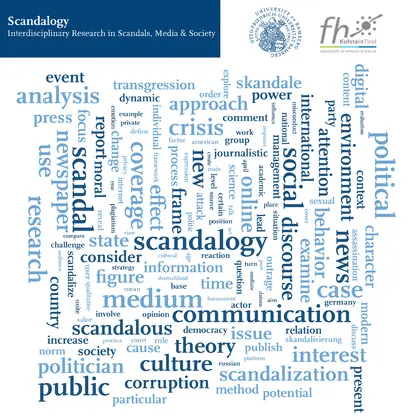Scandalogy: Interdisciplinary Research in Scandals, Media & Society
Scandals are actions that constitute moral or legal transgressions. Corruption affairs, doping cases, and environmental pollution trigger public outrage and involve intensifying phases of media coverage. As such, scandals are not only an essential part of social discourse in modern societies but also of relevance for the field of communication and media studies.
The research initiative fosters a network of international scholars from the broader academic field, such as political communication, journalism studies, public relations, digital communication research, and cultural studies. Its research output is primarily presented in bi-annual conferences and compiled in collected volumes.
The variety of disciplines that focus on scandals as social phenomena warrants proclaiming “Scandalogy” its own field of investigation. In this sense, Scandalogy aims to improve our understanding of the interrelations of scandals and media and study their impact on society.
As a founder of the research initiative, Dr. Hendrik Michael represents Scandalogy at the Institute of Communication Studies here in Bamberg. Prof. (FH) Dr. André Haller represents Scandalogy at University of Applied Sciences Kufstein Tyrol.
Publications
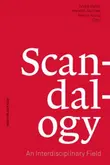
This edited volume presents contributions from international researchers. The book combines empirical research and theoretical studies on scandals which were presented at the 1stInternational Conference in Scandalogy at the University of Bamberg in 2016. Contributions range from the field of communication studies to literary analysis. The publication is a pioneering work that maps the new research field of Scandalogy. You find more information here.
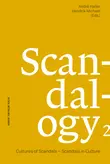
How certain actions lead to mediated scandalization and public outrage is an indicator for the specific scandal culture of a society. For instance, sex scandals used to end political careers in the USA. Nevertheless, the prominent case of Silvio Berlusconi shows that there may be a different 'Mediterranean scandal culture'. With larger political and technological trends in mind, it seems evident that scandal cultures are mutable - although by a long process. The book examines such phenomena more closely because scandal studies lack a deeper analysis of cultural factors in the process of (non-)scandalization. In this publication international researchers present desiderata of scandalogy for cultures of scandals and scandals in culture. Click here for details about the topics and content of the book
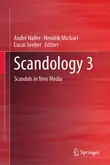
This books presents research on mediated scandas and substantiates the understanding of such forms of scandals and thei impact on societies. It connects the study of scandals with the broader field of political communication research, organizational communication, journalism studies, and digital communication studies. The authors focus on the 21st century as an age of perpetual scandalization and on digital technologies as a catalyst in this respect. Against this backdrop, the book examines different aspects of the transformation of mediated scandals through digital communication practices. Click here to get more information about the book.
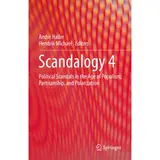
This volume examines the growing presence of populism, partisanship, and polarization and analyzes what this means for scandalization processes. While politics appears to have entered a mode of perpetual crisis and growing dysfunctionality, the rapid succession of scandals may be a symptom of this crisis and its catalyst at the same time. The book provides a better definition of political scandals and discusses from an interdisciplinary and critical scientific perspective how such scandals are relevant to political developments and how they impact public discourse and media practices. International experts from various subfields of communication studies, political communication research as well as related disciplines contribute to the volume with conceptual, empirical, and methodological approaches which reflect on political scandals and the role of media and/or communication. Read chapters from Scandalogy 4 here.
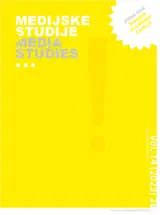
This special issue of Medijske Studije | Media Mtudies presents a global perspective on scandals. The studies published in this special issue showcase that scandals are not trivial. Scandals are like a magnifying lens that offers us insights into the dynamics of public communication and societal change. As such, scandals offer us focal points to observe larger narratives and evolving media practices used by producers and consumers alike. The publication is open access.
Conferences
The aim of this conference was to foster exchange between “scandalogists” from different academic disciplines in order to gather and present recent findings from a wide range of theoretical approaches. We were pleased to welcome scholars from Austria, Portugal, Italy, Finland, Algeria, USA, Russia, and Germany to Bamberg. Keynotes were delivered by Prof. Dr. Robert M. Entman (School of Media and Public Affairs / George Washington University), Prof. Dr. Steffen Burkhardt (Hamburg University of Applied Sciences) and Prof. Dr. Martina Wagner-Egelhaaf (WWU Münster). For more information see here.
The 2nd conference in Scandalogy followed the theme "Cultures of Scandals - Scandals in Culture". It established contacts with colleagues around the globe, who are interested in research of scandals. The conference was conceived as a forum for an academic dialogue about scandals as social phenomena. Prof. Dr. Hans-Mathias Kepplinger (University of Mainz) delivered a keynote on "Functional Analysis or Impact Research - Where is Scandal Research Going?" For more information see here.
The conference focused on “Scandals in New Media Environments”. The overarching theme served a two-fold goal: On the one hand, we intensified research on mediated scandals and substantiated our understanding of such forms of scandals and their impact on societies. On the other hand, we connected the study of scandals with a larger scientific community in the broad field of digital communication research, be it in organizational communication, journalism studies, political communication research or other fields. For more information see here.
The conference theme acknowledges the growing presence of populism, partisanship, and polarization and the need to analyze what this means for scandalization processes. Thus, the aim of this conference is to better understand possible impacts of these phenomena on public discourse and media practices from an interdisciplinary and critical scientific perspective. The organizers invited proposals from all subfields of communication studies, political communication research as well as related disciplines and create a forum where conceptual, empirical, and methodological research is presented, reflecting on political scandals and the role which media and/or communication plays therein. For more information see here.
The conference aims to analyze scandals in all their manifestations in regard to crises, conflicts, and conspiracies and discuss how this interrelation is relevant.The goal is to better understand possible impacts of these phenomena on public discourse and media practices from an interdisciplinary and critical scientific perspective.
Research at Scandalogy 5 comes from all subfields of communication studies, political communication research as well as related disciplines and presents conceptual, empirical, and methodological papers reflecting on scandals and the role which media and/or communication plays therein. The conference program includes both empirically and theoretically focused work from advanced scholars as well as graduate students or doctoral candidates. You find the program for the 5. International Conference in Scandalogy online now.
Academic events
Character assassination and scandals have a lot in common! To explore the links, CARP Lab will host the founders of the Scandalogy Research Initiative, André Haller of the University of Applied Sciences Kufstein Tyrol (Austria) and Hendrik Michael of the University of Bamberg (Germany). In this webinar, Haller and Michael discuss the transformation of scandals by drawing on a comparative framework that makes sense of scandals in global media systems.
Together with crisis researcher W. Timothy Coombs from Texas A&M University we discuss character assassination, scandals, and crisis communication.
Roundtable: Scandals, Character Assassination, and Illiberalism (23.06.2023)
Together with Marijana Grbeša (University of Zagreb) we were invited to a roundtable discussion at 4th CARP International Conference in Amsterdam (virtual) to discuss the relationship between scandals and character assassination in illiberal times.
Research cooperations

The Lab for Character Assassination and Reputation Politics (CARP) is an interdisciplinary research team of scholars studying character assassination. It was founded in 2016 in cooperation with the International Society for the Study of Character Assassination (ISSCA). CARP includes researchers with disciplinary homes in psychology, history, communication, and public relations. The research team spans continents, including scholars here at George Mason University and at the University of Amsterdam.

Prof. (FH) Dr. André Haller is one of the founders of Scandalogy and is working at the University of Applied Sciences Kufstein Tyrol. His research interests are Political and Strategical Communication and Scandal and Crisis Communication. He co-edited the Scandalogy collected volumes with Dr. Hendrik Michael. His recent publications can be found on the University’s Website.

